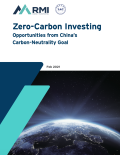This paper compiles available data and analyses, and derives policy messages, for countries in the Asia Pacific region and their partners (including development finance institutions). It characterises an enabling environment that can facilitate and expedite financing for water security commensurate with the challenges and distinctive opportunities in the region.

In this report we identifies seven key investment areas for China’s zero-carbon transition: resource recycling, energy efficiency, demand-side electrification, zero-carbon power generation, energy storage, hydrogen, and digitalization.
The COP16 Accord has been central to the climate accords since 2009 and is an important symbol of trust. It states: "developed country Parties commit, in the context of meaningful mitigation actions and transparency on implementation, to a goal of mobilizing jointly USD 100 billion per year by 2020 to address the needs of developing countries". As the bedrock of international public finance, the $100 billion commitment can work in concert with all pools of finance, including the large and untapped pools of private finance.
This paper outlines design considerations for an effective low-carbon cement standard in the United States, including how to set benchmarks and stringency, how to address leakage and competitiveness, and how to structure cost containment policies.
This report describes an integrated and multi-sectoral blue economy strategy as the key to improving marine and coastal activities, equal opportunities, and livelihoods in Indonesia.
